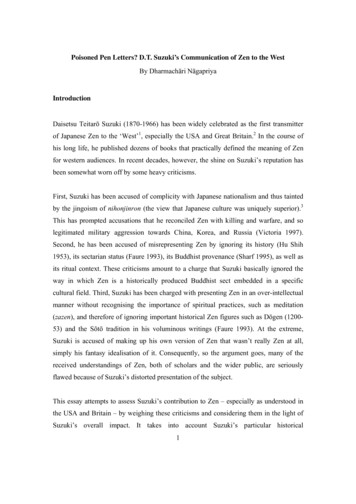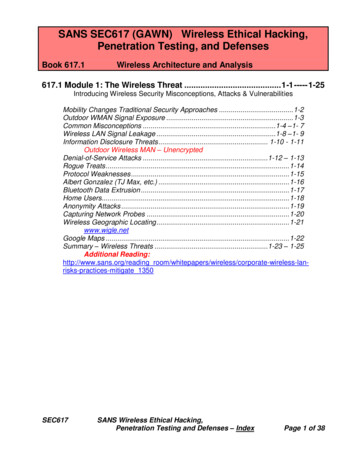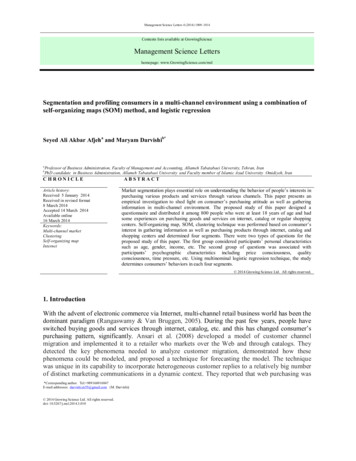
Transcription
Poisoned Pen Letters? D.T. Suzuki’s Communication of Zen to the WestBy Dharmachāri NāgapriyaIntroductionDaisetsu Teitarō Suzuki (1870-1966) has been widely celebrated as the first transmitterof Japanese Zen to the ‘West’1, especially the USA and Great Britain.2 In the course ofhis long life, he published dozens of books that practically defined the meaning of Zenfor western audiences. In recent decades, however, the shine on Suzuki’s reputation hasbeen somewhat worn off by some heavy criticisms.First, Suzuki has been accused of complicity with Japanese nationalism and thus taintedby the jingoism of nihonjinron (the view that Japanese culture was uniquely superior).3This has prompted accusations that he reconciled Zen with killing and warfare, and solegitimated military aggression towards China, Korea, and Russia (Victoria 1997).Second, he has been accused of misrepresenting Zen by ignoring its history (Hu Shih1953), its sectarian status (Faure 1993), its Buddhist provenance (Sharf 1995), as well asits ritual context. These criticisms amount to a charge that Suzuki basically ignored theway in which Zen is a historically produced Buddhist sect embedded in a specificcultural field. Third, Suzuki has been charged with presenting Zen in an over-intellectualmanner without recognising the importance of spiritual practices, such as meditation(zazen), and therefore of ignoring important historical Zen figures such as Dōgen (120053) and the Sōtō tradition in his voluminous writings (Faure 1993). At the extreme,Suzuki is accused of making up his own version of Zen that wasn’t really Zen at all,simply his fantasy idealisation of it. Consequently, so the argument goes, many of thereceived understandings of Zen, both of scholars and the wider public, are seriouslyflawed because of Suzuki’s distorted presentation of the subject.This essay attempts to assess Suzuki’s contribution to Zen – especially as understood inthe USA and Britain – by weighing these criticisms and considering them in the light ofSuzuki’s overall impact. It takes into account Suzuki’s particular historical1
circumstances, which informed the way he both spoke and wrote about Zen, as well asSuzuki’s individual cultural and philosophical formation, which also had an importantbearing on his style of thought and communication. In other words, in the language ofBourdieu, it takes into account the ‘cultural field’ within which Suzuki operated, as wellas his particular habitus.4Section one examines Suzuki’s personal circumstances; in particular, it traces theinfluence of Sōen Shaku and Paul Carus on his intellectual and spiritual development.Section two situates Suzuki’s individual experiences within a broader cultural context, inorder to show how that context informed the account of Zen that he later developed.Section three develops some of the issues and themes raised in the first two sections byexploring Suzuki’s views about the nature of religion and, in particular, of Japanesespirituality. Finally, section four seeks to characterise Suzuki’s presentation of Zen byidentifying some of its distinctive emphases. In doing so, I aim to show that his readingof Zen was both highly sectarian and fatally flawed.1 Personal Context: Decisive InfluencesSuzuki was born in Kanazawa, Ishikawa Prefecture, Japan, the son of a physician. Aftertime spent working as an English teacher, in 1891 he became a student at WasedaUniversity, Tokyo. During this period, he began practising Rinzai Zen under Sōen Shaku(1859-1919) at Engakuji monastery, Kamakura, and later took up residence there. In1893, Suzuki translated Sōen’s address to the World’s Parliament of Religions whereSōen met Paul Carus (1852-1919), a meeting that was to have a profound impact on theyoung Suzuki’s future. Carus was a German émigré and editor of the Open CourtPublishing Company who became a proponent of what he called the ‘Religion ofScience’. He believed in the notion of a universal religion, purged of all superstitioustrappings and irrationality. Such a religion would be in complete harmony with science.Influenced by his meeting with Sōen, Carus subsequently produced The Gospel ofBuddha According to Old Records, an anthology of passages from Buddhist textsassembled from existing translations, together with bits he had himself written which he2
thought summed up the Buddhist message. Suzuki later translated this into Japanese. Wewill return to Carus shortly.Suzuki studied with Sōen until 1897 by which time an arrangement had been made forSuzuki to go and study with Carus in the United States. Shortly before his departure hewas credited with the realization of kenshō and was given the name Daisetsu, ‘GreatSimplicity.’ Sōen and Carus were perhaps the most formative individual influences onthe understanding of Zen, and of religion generally, that Suzuki came to develop.We can learn something of Sōen’s approach to religion and to Zen from his Sermons of aBuddhist Abbot (1906). The book was based on a lecture tour that Sōen made of theUnited States in 1905, and Suzuki translated it. In his preface, Suzuki acknowledges thedegree to which he has reorganized and rewritten the material including changinglanguage where it seemed ‘too Buddhistic’ (Sōen 1906, iv). This has prompted me towonder how far the Sermons represent an accurate record of Sōen’s own thought andteaching and how far they are in fact Suzuki’s ‘revisionary Zen’. What is certainlystriking about the sermons is that they seem to incorporate most of the distinctiveemphases that Suzuki was to make in his later career. For instance, Sōen emphasizes howspiritual awakening is ‘beyond intellectual demonstration’ (ibid. 132). He alsodistinguishes between dhyāna and prajñā (ibid. 137, though he seems to value meditationmore highly than Suzuki came to), offers a universalist vision of spiritual experience(ibid. 138), and an idealized presentation of the Oriental mind:The Oriental mind ever strives after the One and is so idealistic in all itstendencies as sometimes altogether to ignore the external world. (ibid. 148)Such a nihonjinron vision of the Oriental (more properly the Japanese) mind iscontrasted with that of ‘Occidentals’ who ‘lack the unfathomableness’ (ibid.153) of theOrientals. Sōen concludes that, ‘Generally speaking the West is energetic, and the Eastmystical.’ (ibid. 154) He also offers a dubious exoneration of killing in the context ofwar:3
The hand that is raised to strike and the eye that is fixed to take aim, do notbelong to the individual, but are instruments utilized by a principle higher thantransient existence. (ibid. 196)In this remark, Sōen would appear to remove individual responsibility for war acts sincethe good soldier is acting according to a ‘higher power’; killing for one’s countrytherefore becomes an act of self-transcendence, even a spiritual act by means of whichone goes beyond the individual ego. It is worth noting that the lecture tour took placearound the time of the Russo-Japanese War (1904-5).Sōen also offers an evolutionary vision of the Buddhist tradition, a theme that Suzukiwould develop in his Outlines of Mahāyāna Buddhism. In part protesting against theessentialism of Pāli scholars who privileged the early Buddhist texts and saw the latertraditions as degenerations, Sōen wrote:For Buddhism, like many other religions, has gone through several stages ofdevelopment before it has attained its present stage of perfection among Orientalnations Properly speaking, Hīnayāna Buddhism is a phase of MahāyānaBuddhism. The former is preparatory for the latter The Buddhism of present Japan, on the other hand, is Mahayanistic. It is morecomprehensive, more religious, more humanistic, and more satisfying to theinnermost needs of the religious consciousness. (quoted in Lopez 2002, 36-7)These are very bold claims. He later concludes:In the Buddhism of Japan today are epitomized all the essential results reachedthrough the unfolding of the religious consciousness during the past twenty orthirty centuries of Oriental culture. (ibid. 37)Thus contemporary Japanese culture represents the apogee of religious development andthis development is coterminous with Buddhism. A little later we will see how Suzuki4
amplified some of these points, but before doing so let us return to Carus and hisinfluence on Suzuki.After translating his Gospel, Suzuki went to work for Carus in LaSalle, Illinois (18971908). In his study of this period of Suzuki’s life, Bando (1967) concluded,It may be said that the inception of all his philosophical and intellectual activitiesthereafter can be traced back to this period. (Bando, 138)This claim seems to somewhat overstate the case since the thumbnail sketch offeredabove of Sōen Shaku’s views, shows that Suzuki’s outlook had already been significantlyshaped before his encounter with Carus, albeit in a manner on the whole sympathetic toCarus’ own views. Notwithstanding, there is no doubt that this period in Americainfluenced Suzuki and helped to germinate his understanding of religion and what was tobecome his presentation of Zen.In summarizing Carus’ preface to The Gospel, Lopez writes,Here Carus makes clear his project to present Buddhism in its ideal form, freefrom the complications presented by the accretions of sects and history. Hisultimate goal is to lead his readers to the Religion of Science, towards whichBuddhism and Christianity, when understood correctly, point the way. (Lopez2002, 25)Carus himself voices his intentions when he writes:The present book follows none of the sectarian doctrines, but takes an idealposition upon which all true Buddhists may stand as upon a common ground.(quoted ibid. 26)For someone with as limited knowledge of the Buddhist tradition as Carus must havehad, this is an ambitious claim. We can see here a prevailing preoccupation of late5
nineteenth century thought – and a theme that was central to the World’s Parliament –which is the notion of universal or world religion.5 Carus wants to propose that there issome common core that unites all Buddhists and which therefore defines the essence ofwhat Buddhism means. Yet he later concedes that he is determined to read the Buddha’slife in the light of its ‘religio-philosophic importance’ and so in editing the various textshe ‘has cut out most of their apocryphal adornments, especially those in which theNorthern traditions abound.’ (quoted ibid. 26)Carus’ agenda therefore becomes clear; he believes that the mythological elements ofBuddhism – indeed of religion generally – are introduced to make the Buddha’s doctrinesamenable to the masses (ibid. 29). He does not see them as integral to the Buddhistmessage. This is important because Carus wants to argue that both Buddhism andChristianity, in varying degrees, reveal a ‘cosmic religion of truth’ (ibid. 28-29) thattranscends all sectarian divisions. It is in favour of such a cosmic religion that Caruswants to proselytize. This notion of a universal religion, beyond sectarian differences,became important to Suzuki in the way that he came to define Zen.We can now consider in more detail how the views of Sōen and Carus helped to shapeSuzuki’s understanding of religion and of Zen. Since religion is the more generalcategory, we will begin with this. In Outlines, Suzuki suggests,If the Buddha and the Christ changed their accidental places of birth, Gautamamight have been a Christ rising against Jewish traditionalism, and Jesus aBuddha, perhaps propounding the doctrine of non-ego and Nirvāna andDharmakāya. (ibid. 29)Such speculation affirms the notion of a universal ‘spirit of religion’ (ibid. 23),independent of any particular historical form or doctrine. In explaining what he means bythis Suzuki writes:By the spirit of religion I mean that element in religion which remains unchangedthrough its successive stages of development and transformation: while the form6
of it is the external shell which is subject to any modification required bycircumstances. (ibid. 23)It would seem then that the ‘spirit’ of religion is universal and perennial but its ‘form’specific and temporal. Suzuki also asserts that religion ‘must work in perfect accord withthe intellect’, and that ‘Religion and science, when they do not work with mutualunderstanding, are sure to be one-sided.’ (ibid. 26) Carus had also emphasized both thesethemes.It is also worth noting that Suzuki held to an immanent explanation of religion; hebelieved that religion emerges from the individual’s spiritual needs and experience. Hewrote, for instance,The abiding elements of religion come from within, and consist mainly in themysterious sentiment that lies hidden in the deepest depths of the human heart,and that, when awakened, shakes the whole structure of personality and bringsabout a great spiritual revolution, which results in a complete change of one’sworld-conception. (ibid. 28)While this vision of the true origin of religion may be attractive and poetically expressed,it betrays anything but a universalist understanding. To claim, for instance, that ‘religioncomes from within’ would be to contest the notion of revelation, a leading idea in severalreligions, not least Christianity. In fact, Suzuki’s vision of religion as presented here is animmanent version of Buddhist teaching, displaying the obvious influence of Buddhanature thought – as much of East Asian Buddhism does.6 It appears that Suzukiuniversalizes what is in fact a particular religious vision.7 He is really talking about Zeninsight but stripping it of its traditional vocabulary. This kind of move allowed Suzuki togo on to claim that Zen represents the essence of religion, as we will see.The irony of Suzuki’s position is that while he could be read as succumbing to thehegemonic intentions of institutions like the World’s Parliament of Religions, he in fact7
subverts those intentions for his own ends. John Henry Barrows (1847-1902), Chairmanof the Parliament, declared for instance,We believe that Christianity is to supplant all other religions because it containsall the truth in them and much else besides (quoted in Ketelaar 1990, 139).While the ‘Orientalist’ aspirations of some western scholars and religious figures soughtto annex all that was of value in Buddhism to some universalized form of Christianity,Suzuki, far from buying into their agenda actually turns it back on themselves.8 Suzukithen operates what might be called a ‘reverse Orientalism’ or Occidentalism,9 whichseeks to incorporate what is of value in, for instance, Christianity, in a universalizedvision of Buddhism (and more specifically Zen). Suzuki did not simply imbibe Carus’project and regurgitate it unthinkingly but rather turns the sword of Orientalism back onitself. In section three, I will develop this theme by considering Suzuki’s account ofJapanese spirituality.2 Cultural Context: Nationalist Responses to PersecutionThe cultural field in which Suzuki grew up was one of insecurity and change as far asBuddhism was concerned. The Meiji Restoration (1868) had led to a period of fairlyrough treatment for Buddhist institutions and practitioners. Collcutt (1986) has shownthat even before the Meiji period significant repression of Buddhism had been going on.This continued during the Meiji period, though its intensity diminished. It would not bean exaggeration to claim that in the 1870s-90s, and even beyond, Buddhism was inretrenchment and most definitely under threat. The power of the state was growing, thepower of the Sangha diminishing. This was the world into which Suzuki was born andwithin which he encountered Buddhist teachings.Brian Victoria (1997) has shown that one of the primary responses to this process on thepart of Buddhists was to align themselves with the nationalist concerns of the rulinggovernment. In order to avoid persecution – and therefore potential extinction – the vast8
majority of Buddhist leaders chose to subordinate their morals and spiritual values to thequestionable nationalist and even colonialist aspirations of the Meiji regime. Suzuki’sown spiritual director, Sōen Shaku, was no exception. Sōen is known, for instance, tohave gone even to the battlefield to deliver rousing talks to help inspire the troops and aidthem to see the rightness of their cause (Victoria, 26).It was perhaps inevitable that Suzuki’s attitudes towards war and the state would beinfluenced by Sōen’s attitude. For instance, Victoria quotes from Suzuki’s first writtenwork, published in 1896 - just a month before his supposed Awakening experience(kenshō):The purpose of maintaining soldiers and encouraging the military arts is not toconquer other countries or deprive them of their rights or freedom Theconstruction of big warships and casting of giant cannon is not to trample on thewealth and profit of others for personal gain. Rather, it is done only to prevent thehistory of one’s country from being disturbed by injustice and outrageousness ifthere is a lawless country which comes and obstructs our commerce, or trampleson our rights, this is something that would truly interrupt the progress of allhumanity. In the name of religion our country could not submit to this. Thus, wehave no choice but to take up arms in order that justice might prevail. (quotedibid. 109)Out of context, such a quote seems reasonable. The situation becomes more complex ifsuch a point of view is then used to defend, for instance, Japanese colonialist activity inChina and Korea. Are these states ‘lawless’? Do they ‘interrupt the progress of allhumanity’? Suzuki might perhaps be forgiven for his youthful naiveté and thus forsuccumbing to nationalist rhetoric in a piece that might be written off as juvenile butVictoria’s case against Suzuki also draws on his more mature writings. In particular,Victoria identifies Suzuki’s writings about Zen and swordsmanship as embodying thesame spirit as his earlier nationalist sentiments.9
In his Zen Buddhism and Its Influence on Japanese Culture, Suzuki writes extensively onthe theme of ‘Zen and Swordsmanship’ as well as ‘Zen and the Samurai’. Since anystudent of Buddhism will know that ahi sā (non-harm) is one of the cardinal principlesof Buddhism,10 Suzuki had his work cut out to reconcile what appear to be mutuallycontradictory themes. Suzuki himself recognises this apparent contradiction (1938, 34)but goes on to offer several reasons why Zen is compatible with the Samurai spirit. Hewrites, for instance that,Zen discipline is simple, direct, self-reliant, self-denying, and this ascetictendency goes well with the fighting spirit. (ibid. 35)This may well be true but it doesn’t really address the issue that if Zen is a form ofBuddhism, it will be committed to non-violence, a stance that would seem radically atodds with the spirit of the Samurai. It is here that the problematic nature of Suzuki’spresentation of Zen begins to show its darker side. Throughout his writings, Suzuki isdetermined to show that Zen is an intuitive experience, not fixed to any particular set ofconcepts or ideas. It is because he takes such a view that he can go on to say:Zen has no special doctrine or philosophy with a set of concepts and intellectualformulas, except that it tries to release one from the bondage of birth and deathand this by means of certain intuitive modes of understanding peculiar to itself. Itis, therefore, extremely flexible to adapt itself almost to any philosophy and moraldoctrine as long as its intuitive teaching is not interfered with. It may be foundwedded to anarchism or fascism, communism or democracy, atheism or idealism,or a political or economic dogmatism. (ibid. 36)This is a problematic claim. It is certainly true to say that Buddhism generally does notaim simply to instil a body of dogma but rather to catalyse the experience of Awakening(bodhi).11 But at the same time the importance of Right View (samyak di) as aplatform for spiritual awakening is widely stressed.12 Buddhist teachings are seen as themeans towards spiritual awakening and, while they do not in themselves embody theultimate truth (paramārtha satya) but only the relative (sa v ti satya), they are not10
arbitrary.13 In a well-worn simile, the Buddhist teachings are a raft that enables passageto the further shore of Awakening.14 In the section quoted above, Suzuki goes so far as toadmit that some teachings or ideas might ‘interfere’ with the intuitive teaching, yet heclearly doesn’t think that dogmas like fascism would necessarily do so.These considerations strike at the heart of what is problematic about Suzuki’spresentation of Zen. While he is surely correct that the aim of Zen practice is to realise astate of spiritual awakening (the ‘intuitive’ experience that he refers to), it is alsoimportant to recognise that this awakening does not happen in a vacuum but requires acarefully prepared context. This context includes ideas and beliefs as well as rigorousspiritual practices. In emphasising the ‘intuitive’ characteristic of Zen experience, Suzukiseems to ignore the conditions necessary to prepare for this experience.Suzuki engages in a lengthy discussion of the historical links between Zen and theSamurai, in particular focusing on the theme of Bushido (‘the warrior’s way’). He pointsout that warriors needed an ascetic spirit and that they also needed to keep the idea ofdeath before them night and day (ibid. 48). Suzuki clearly sees such a reflection as a Zenone. But he seems to conflate two quite different things: it is one thing to say that theSamurai appropriated various themes from Zen practice and teaching, it is quite anotherto suggest that the two traditions are in harmony. Suzuki seems to argue from thehistorical linkage between Zen and the Samurai towards some spiritual correspondence.This does not seem justified without further support.In his conclusion concerning Zen and the Samurai, Suzuki states:Zen did not necessarily argue with [the Samurai] about immortality of the soul, orabout the righteousness of the divine way, or about ethical conduct, but it simplyurged to go ahead with whatever conclusion rational or irrational a man hasarrived at. (ibid. 64)11
Such a statement encapsulates a Zen stripped of all its Buddhist credentials. Ethics (Śīla)is no longer important;15 all that matters is that one act on one’s convictions (seemingly,no matter whether they are cruel or compassionate).In such conclusions, Suzuki’s Zen parts company with any version of traditionalBuddhism. It becomes a ‘system’ that can be aligned to any philosophy, whatever itsprovenance or its ethical flaws.In later writings, Suzuki expresses a less positive view of the role of violence and evenmilitary action. In Japanese Spirituality, for instance, Suzuki condemned the apparentalliance of Buddhism and the state, particularly as this expressed itself in the SecondWorld War. He writes, for instance,As militarism became fashionable in recent years, Buddhism put itself in stepwith it, constantly endeavouring not to offend the powerful figures of the day. Asa result, Buddhists neglected to awake within the Japanese religiousconsciousness the philosophical and religious elements, and the spiritualawakening, that are an intrinsic part of Buddhism. (quoted in Victoria, 148)It would seem then that Suzuki himself took no responsibility for the alliance of religiousand military interests, despite his active promotion of the unity of Zen andswordsmanship, and Bushido. Victoria sees in Suzuki’s post-war Japanese writings acontinuing attempt to defend Japanese aggression, even while condemning it (Victoria,50-1). But Suzuki told a different story to his English-reading audience. He writes forinstance,The Pacific War was a ridiculous war for the Japanese to have initiated; it wasprobably completely without justification. (in Abe 1986, 24)Victoria points out that nowhere in any of Suzuki’s writings is there even a hint of regretfor Japan’s other colonial and military efforts in, for instance, China, Korea, and Taiwan(Victoria, 151).12
While Victoria’s overall assessment of Suzuki in relation to militarism is rather damning,Kirita Kiyohide has offered a much more sympathetic reading of Suzuki’s views on thismatter. Drawing on the same sources as Victoria, Kirita comes to a rather differentassessment of Suzuki’s views of the state and of nihonjinron. For instance, Suzuki wrotein his first published work in Japanese, A New Theory of Religion:Religion never hesitates to question the existence of the state and history; thestate always acts on the basis of its own self-centred interests. In this way,religion and the state are incompatible. (quoted in Heisig, 53)These hardly seem the words of a nationalist appeaser. Yet elsewhere in the same workSuzuki proposes that the role of religion is ‘first of all to try to support the state and toabide by the history and sentiments of its people.’ (quoted in ibid. 53) These statementsseem rather at odds with one another and may well reflect a youthful Suzuki (he was inhis mid-twenties) who was confused about what he thought. In later writings, heexpresses criticisms of the Imperial family and questions the greatness of the Japanesepeople (ibid. 54-5). Kirita argues that Suzuki condemned the linkage of Zen with war andwhere he couldn’t actively condemn it, he chose to write on more general Zen subjects(ibid. 60-1). Kirita quotes, for instance, the following:Some people think that to die recklessly is Zen. Zen absolutely never teaches oneto throw one’s life away. (ibid. 61)While this could be read as a criticism of the ‘kamikaze squadrons’ of the Second WorldWar, it does not, however, represent a condemnation of war and aggression generally.Kirita acknowledges that Suzuki’s writings link Zen and the Samurai class in Japanesehistory but suggests that this does not mean that Suzuki thought this entailed a linkagebetween Zen and modern warfare. Kirita’s conclusion is that[Suzuki’s] intention was to show that since Zen experience is itself value-neutral,it can be adapted to various times and societies. (ibid. 72)13
But it is this emphasis on the value-neutrality of Zen that is precisely the problem,allowing Zen to be co-opted by any regime no matter what its ethical underpinnings.3 Suzuki, Japanese spirituality, and nihonjinronIn considering Suzuki’s views on the uniqueness and special character of Japanesespirituality, the depth of his prejudices and his jingoism become more explicit. Butbefore looking at Suzuki’s own views in more detail, it is worth recognizing how hisviews participated in a general current of modern Japanese thought: nihonjinron. Wehave already learnt that Sōen Shaku held to some rather dubious generalizations aboutthe nature of the ‘oriental mind’ and how he compared the western mind unfavourablywith it, but such Occidentalism was in fact more broadly sponsored. In the words ofRobert Sharf, nihonjinron was[A] popular discursive enterprise devoted to the delineation and explication of theunique qualities of the Japanese [and was] in large part a Japanese response tomodernity – the sense of being adrift in a sea of tumultuous change, cut off fromthe past, alienated from history and tradition. (Sharf 1995, 136-7)Sharf cites a range of thinkers and writers whose works belong to this genre, includingleading philosophers like Nishida Kitarō, a personal friend of Suzuki (ibid. 135-8).Suzuki’s writings must be placed in the context of this cultural field. His own views areperhaps expressed most fully in his Japanese Spirituality. An examination of this textreveals the connections that Suzuki makes between Japaneseness, spirituality (reisei),and Zen. He writes:The Japanese felt a kind of satisfaction when they saw the shape of theirspirituality reflected [in Zen]. From the beginning there has been something inJapanese spirituality that could be regarded as “Zen-like”. Since this was14
awakened by the chance appearance of Zen, it would be confusing cause andeffect to say that Zen is foreign. (1972, 23, my italics)He also speaks of ‘the Zen character of Japanese spirituality’ (ibid. 19) and claims that‘Buddhism is really a manifestation of Japanese spiritual awakening.’ (ibid. 59) Suzukiappears to claim that, even before Zen came to Japan, there was an innate character toJapanese spirituality that harmonized with Zen; Zen became the occasion for theactivation of Japanese spirituality, rather than the means by which it was produced. Thefact that Japanese spirituality was activated through a Buddhistic form was a ‘historicalaccident’ (ibid. 18). This implies that Zen is not really Buddhist (or at least notexclusively so).In analysing the character of Japanese spirituality, Suzuki writes:[I]t exists in its purest form in Jōdo (Pure Land) thought and in Zen since in myview Buddhism is not primarily an imported, religion, I feel that neither Zen norPure Landpossess a foreign nature. (ibid. 17-18)Shinshū experience is really nothing else than the exercise of Japanesespirituality. That it emerged within a Buddhist context was a matter of historicalchance – it does not prevent in the least the essential quality of the Shin sect frombeing identified with Japanese spirituality. (ibid. 20-1)16What is puzzling about these passages is that we have already learnt from Suzuki thatJapanese spirituality is Zen-like, yet we now learn that Shin experience also expresses theessential quality of Japanese spirituality. This seems to imply that Shin thought must alsobe Zen-like which is clearly false; Shin Buddhism and Zen are very different things.17Notwithstanding, Suzuki tries to wed these apparently distinct streams of ‘Japanesespirituality’ by claiming:15
Pure Land experience is manifested on the affective or emotional side of Japanesespirituality; on its intellectual side appears the transformation to Zen of Japaneselife.The emotional development of Japanese spirituality points to theunconditional Great Compa
way in which Zen is a historically produced Buddhist sect embedded in a specific cultural field. Third, Suzuki has been charged with presenting Zen in an over-intellectual manner without recognising the importance of spiritual practices, such as meditation (zazen), and therefore of ignoring important his











